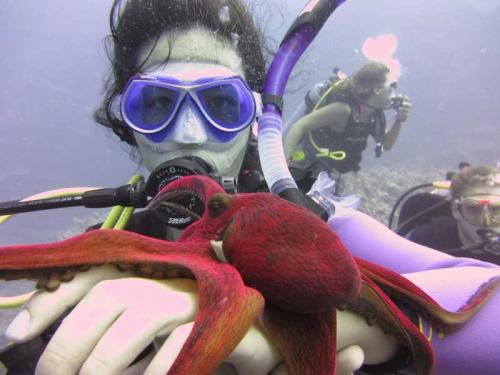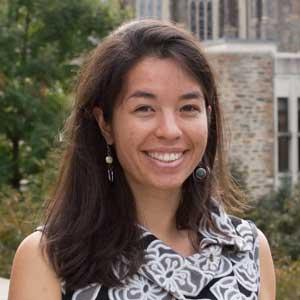
As soon as she got in the water, Melody Jue could feel the cold. The chill from the Arctic current that sweeps through the Monterey Bay was seeping through her “blubber”—two layers of diving suits, a hood, gloves, and diving boots. She was baking in that ensemble earlier in the parking lot, but now she was thankful to be wearing it.
As she began to descend, she looked down at her feet and saw a dark mass the size of a bus.

“I thought, ‘Oh my god, what is this?!’ ” Jue says. “Here I had been ready to see seals, birds, sharks—I was ready. But then there was this massive who-knows-what coming up under me.”
She decided to retreat to the surface, but her divemaster went down to identify the mysterious mass.
“It was a big mound of kelp,” Jue says. “I was like, ‘Oh my god! I was scared of a plant!’ ”
That adventure came relatively soon after Jue earned her scuba-diving certification in 2011. Since then, she has had a number of memorable dives while doing research for her dissertation. Off the coast of Mexico, she swam with whale sharks. In the waters of Hawaii, she felt the “cold sensation” of an octopus’s grip. On the Yucatan Peninsula, she explored ancient underwater caverns that once sustained the Maya.
Her dissertation, by the way, is on literary theory, a subject that she herself says has a “terrestrial bias.”
So what is she doing underwater?
Return to the Sea

"I had an epiphany that I could integrate the ocean into what I do as a literary scholar."
Jue grew up in San Diego, where trips to the beach and the aquarium cultivated a lifelong interest in the ocean. For a long time, she wanted to be a marine biologist, but her interest in English as an undergraduate drew her away from the science path, and she figured that studying the ocean as a career was a door that had closed.
That changed, however, during her first year in the Graduate Program in Literature at Duke. While taking a course on space and place, she noticed that her class readings were all about landlubbers.
“They all had to do with the city as a place that humans walked around in,” she says. “None of our readings were about the ocean. I was also watching a lot of ocean documentaries at the time just to relax. I had an epiphany that I could integrate the ocean into what I do as a literary scholar. That was a big turning point.”
As she began to pursue that topic, Jue decided she needed to do more than just read about the ocean; she needed to experience it. Four years and 35 dives later, she is wrapping up a dissertation that examines how several key concepts of media theory would hold up underwater.
“When I first started on this project, someone warned me: Be careful what you pick as your dissertation topic because by the end you’ll be sick of it and you will not want to study it at all, and if you pick something you really love, it will ruin it for you,” says Jue, who is graduating in May 2015 and has accepted a position in literature and environment in the English department at the University of California Santa Barbara.
“But that hasn’t been my experience. Rather than ruining the ocean, it has given me more of an opportunity to meet other divers and marine scientists and realize how small a body of work I’ve begun to write.”
A New Way to View the World
Jue’s work has led her into the emerging field of ocean humanities, which she describes as a broad interdisciplinary turn across literature, history, anthropology, cultural studies, geography, and postcolonial theory to treat the ocean as a topic of study and as a force that shapes how we view the world.
“The ocean constantly challenges our expectations of what is normal, or how we understand our concepts,” says Jue, a Katherine Goodman Stern Fellow. “In water, we really need to develop a new vocabulary to deal with what we’re trying to understand, and in the process of doing this, it becomes apparent how much the terrestrial environment has characterized our thinking about pretty much everything.”

For an illustration of how the ocean might challenge our thinking, look no further than summer 2014. Jue used a summer research fellowship from The Graduate School to go on a diving expedition in Mexico to see the underwater sculptures by Jason deCaires Taylor. There, she experienced firsthand how the ocean can change the viewer’s relationship to the artworks.
“In a museum, it’s pretty easy to not touch stuff; you just don’t touch it,” she says. “But when you see the sculptures, you have to adjust for buoyancy and figure out where you are in relation to them, so not touching is a lot harder. You are sort of in this panic. Instead of being this passive observer in the museum, you have to really be active about where you are in relation to the sculptures.”
The trip also presented a different concept of a museum—as a place of change rather than preservation. The sculptures were made with materials that encourage organisms to grow on them. When Jue got there, the sculptures had been beset by a bloom of algae growth and looked very different than the pristine condition shown in pictures.
The trip later provided an alternate concept of an underwater museum. While in Mexico, Jue decided to go diving in limestone caverns and passages that once served as sources of freshwater for the Maya. Amid the stalactites and stalagmites in quiet caverns bathed in blue light, she spotted little-disturbed fossils.
“Mexico was really interesting because it offered these two different ideas of a museum—one that changes all the time in the seawater and one that has been preserved from since before the last ice age,” Jue says.
The insights she gleaned from the trip are going into the conclusion of her dissertation, in which she dunks the notion of museums into an underwater environment.
“When I’m diving, I don’t think about theory,” she says. “That all comes later. You just enjoy being there and reflect on your experience afterwards.”
In addition to her Katherine Goodman Stern Fellowship, Melody Jue’s graduate study has been supported by a James B. Duke Fellowship and two Summer Research Fellowships from The Graduate School.